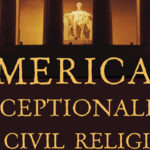If You Can Keep It: The Forgotten Promise of American Liberty
By Eric Metaxas (Viking)
Author and cultural commentator Eric Metaxas presents a compelling case for American exceptionalism—but not as the term often is understood. While he applauds love for the United States and its founding principles, Metaxas criticizes calls to “love it or leave it.” He embraces authentic patriotism as a virtue but rejects jingoistic nationalism as a vice.
 Metaxas focuses on the paradox at the heart of true American exceptionalism. America does not exist primarily for itself but for others, he asserts. As the son of Greek immigrants, he makes it clear the promise of American liberty extends to people who have not yet had the opportunity to experience it. “We are a nation with a mission to the rest of the world,” he writes.
Metaxas focuses on the paradox at the heart of true American exceptionalism. America does not exist primarily for itself but for others, he asserts. As the son of Greek immigrants, he makes it clear the promise of American liberty extends to people who have not yet had the opportunity to experience it. “We are a nation with a mission to the rest of the world,” he writes.
Metaxas finds fault both with liberal and conservative notions of freedom. Liberals, he asserts, often equate freedom with unrestrained sexual expression. Conservatives, on the other hand, often view freedom primarily in terms of an unregulated free market. Metaxas writes: “The free market is amoral. It delivers what people want, so if the desires of the people are good desires, good things will come. But if the people want better and cheaper pornography and better and cheaper drugs, the free market will oblige.”
Metaxas acknowledges his debt to author Os Guinness for helping him understand what Guinness calls “the Golden Triangle of Freedom” in his book, A Free People’s Suicide. It stands on three axioms: “Freedom requires virtue. Virtue requires faith. Faith requires freedom.” Again, Metaxas defies easy liberal/conservative categories. He critiques liberal secularism that seeks liberty without a moral and religious foundation, but confounds some conservative religionists with his assertion religion thrives in the United States because it is free and uncoerced.
Baptist readers, in particular, should applaud his references to Roger Williams and to Thomas Jefferson’s famous “wall of separation” letter to the Danbury Baptists. He concludes, “Only when religion was truly free could it be true religion—and only then could all other freedoms follow.”
Metaxas provokes and prods while entertaining and inspiring. Readers of varied political persuasions will find plenty to confirm their convictions and challenge their presuppositions in If You Can Keep It.
Ken Camp, managing editor
Sign up for our weekly edition and get all our headlines in your inbox on Thursdays
Baptist Standard













We seek to connect God’s story and God’s people around the world. To learn more about God’s story, click here.
Send comments and feedback to Eric Black, our editor. For comments to be published, please specify “letter to the editor.” Maximum length for publication is 300 words.